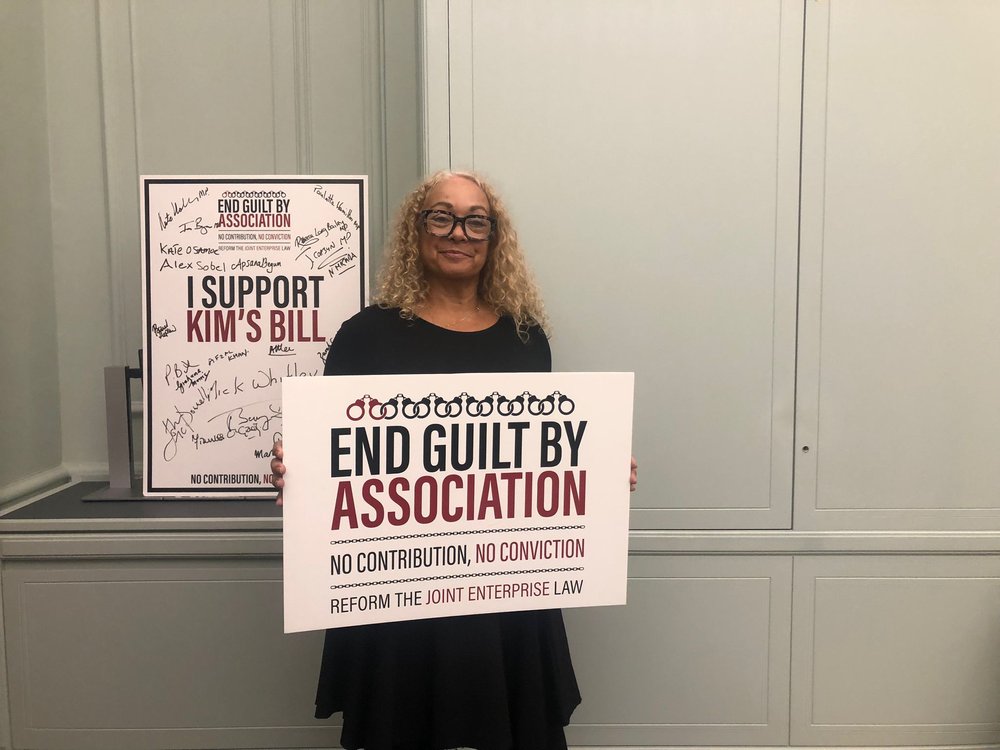The government has blocked a proposed amendment to the law to stop innocent people being wrongly imprisoned under the controversial joint enterprise doctrine, despite cross-part support and a commitment from the Labour frontbencher to reform. On Friday MPs debated Labour Kim Johnson’s Bill which sought to tighten up the law to protect peripheral actors from being found ‘guilty by association’.
Whilst the Bill received support from across the House of Commons, the government opposed it on the grounds that, according to justice minister Gavin Bacon, the change could lead to ‘difficulties in securing a conviction and therefore bringing offenders to justice’. The proposals sought to narrow the scope of joint enterprise to ensure that only those who make a ‘significant contribution’ to a crime will be prosecuted under the law.
Kim Johnson explained that this amendment was intended to bring the doctrine back in line with its original intent: to prosecute those who actively aided and abetted in a serious offence. The Labour MP for Riverside, Liverpool said she was ‘deeply disappointed that the government missed this opportunity today to address the joint enterprise miscarriage of justice’. ‘It was clear from the debate that there is cross-party consensus that joint enterprise is flawed,’ she said. ‘There have been concerns raised for over a decade, and I hoped that today would finally result in decisive action and a win for the JENGbA families who have fought so hard for so long.’
Janet Daby, Labour shadow justice minister, said her party had previously committed to reform joint enterprise ‘and that remains our ambition’. She said that the Bill was ‘perfectly reasonable and commendable’ but wanted further data from the CPS. ‘Many from across the political spectrum believe that change needs to happen,’ Daby continued. ‘There are some cases of people being convicted of serious crimes despite making no significant contribution to them; we have heard such examples given from across the Chamber. It is not in the public interest to prosecute those who have not made a significant contribution to a crime.’
Johnson welcomed her party reaffirming its commitment to reform. ‘Today is just a further step in a long campaign and I will continue to fight alongside the JENGbA families until we achieve justice,’ she said.
In its current form, the joint enterprise doctrine allows individuals to be jointly charged with the crimes of another if the court decides they ‘foresaw’ that the other party was likely to commit that crime and intended to encourage or assist them. This has resulted in ‘bystanders, or people involved in much lesser criminal offences, being convicted of murder or manslaughter’.
Over the past decade, a consensus has grown amongst political, legal and academic experts on the inconsistency of the doctrine and its disproportionate impact on young people and those from BAME backgrounds. CPS figures reveal that ‘over half (54%) of the defendants in CPS pilot cases were children and young people’. Many of these defendants’ prison sentences are longer than their age at the time of their conviction.
High-profile cases include that of Jordan Cunliffe, a 15 year old blind boy. Despite not having made contact with the victim and having a visual acuity of 10%, Jordan was sentenced to life imprisonment for murder. Another is Edward Conteh, a teenager who was imprisoned for a murder he did not even witness, much less carry out. Upon his release, Conteh was deported as a foreign criminal. Laura Mitchell was looking for her shoes in a car pack when a man was killed outside a Bradford pub. Mitchell was sentenced to life for murder with a minimum term of 13 and a half years.
Many of the opposition’s interventions during the debate focused on combating Joint Enterprise’s disproportionate impact on BAME communities. According to CPS figures, Black people are 16 times more likely than white people to be prosecuted under joint enterprise.
Research undertaken by the the Institute of Race Relations indicates that the racialised profile of JE defendants is partly due to the power ‘gang narratives’ hold within the courts. As Becky Clarke, a Senior Lecturer at Manchester Metropolitan University, has written:
‘Prosecutors ‘attribute racialised criminal markers upon those in the periphery of events’, with these courtroom strategies drawing on long precipitated criminalising narratives of the communities within which many of the defendants live.’
In the US, similar issues surrounding racial discrimination and failed crime prevention catalysed widespread reforms of JE-style laws. However, the UK’s attempts at legal reform have thus far had little discernible effect.
In 2016, the Supreme Court ruled that the law had ‘taken a wrong turn’ in its application of foresight. However, rather than leading to a reduction in JE prosecutions, the number of Black defendants prosecuted for murder under JE has risen since its passage. Despite these significant failings, the Jogee case has triggered a groundswell of legal wins for campaigners fighting for a fairer justice system.
In 2023, for instance, Liberty and campaign group Jengba won a landmark case against the CPS for failing to collect data on the characteristics of defendants in JE cases. The judges found that the CPS’ omission was a breach of the duty under the Equality Act 2010 and ordered them to collect and publicize data on JE convictions. This data will be critical to informing future legal challenges.
Campaigners recently rose the alarm over the cost of Joint Enterprise convictions to the British taxpayer. New research from the Manchester Metropolitan University has found that for the 1,088 people on average convicted under joint enterprise every single year, ‘the total future punishment costs the taxpayer a colossal £1.2 billion.’







